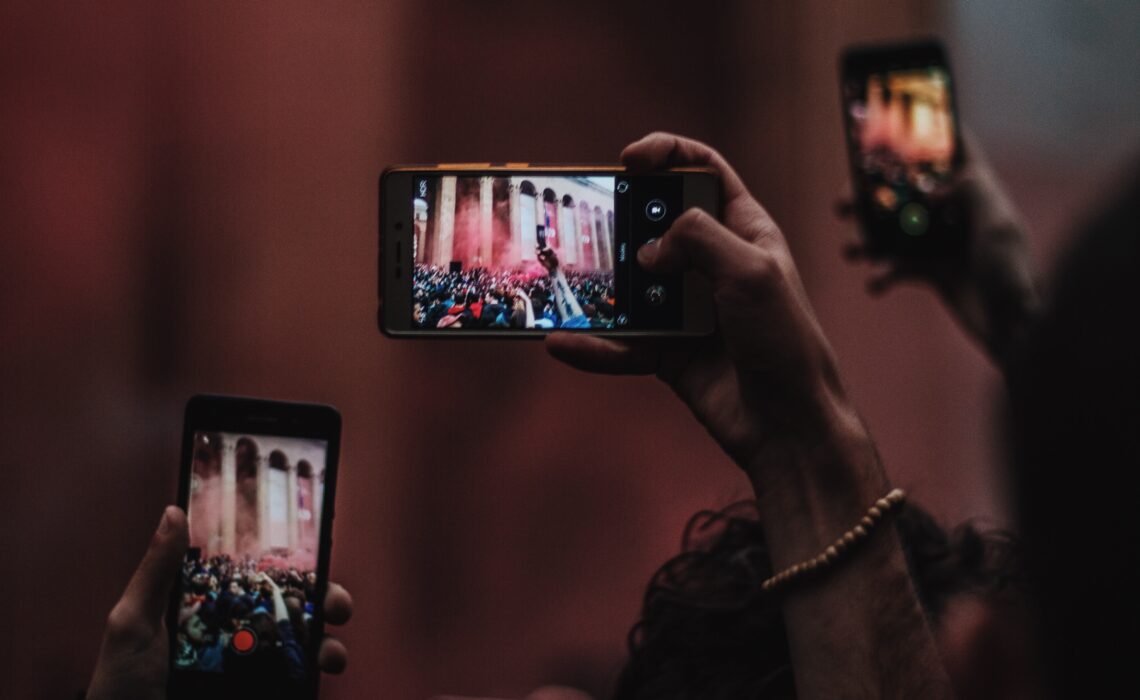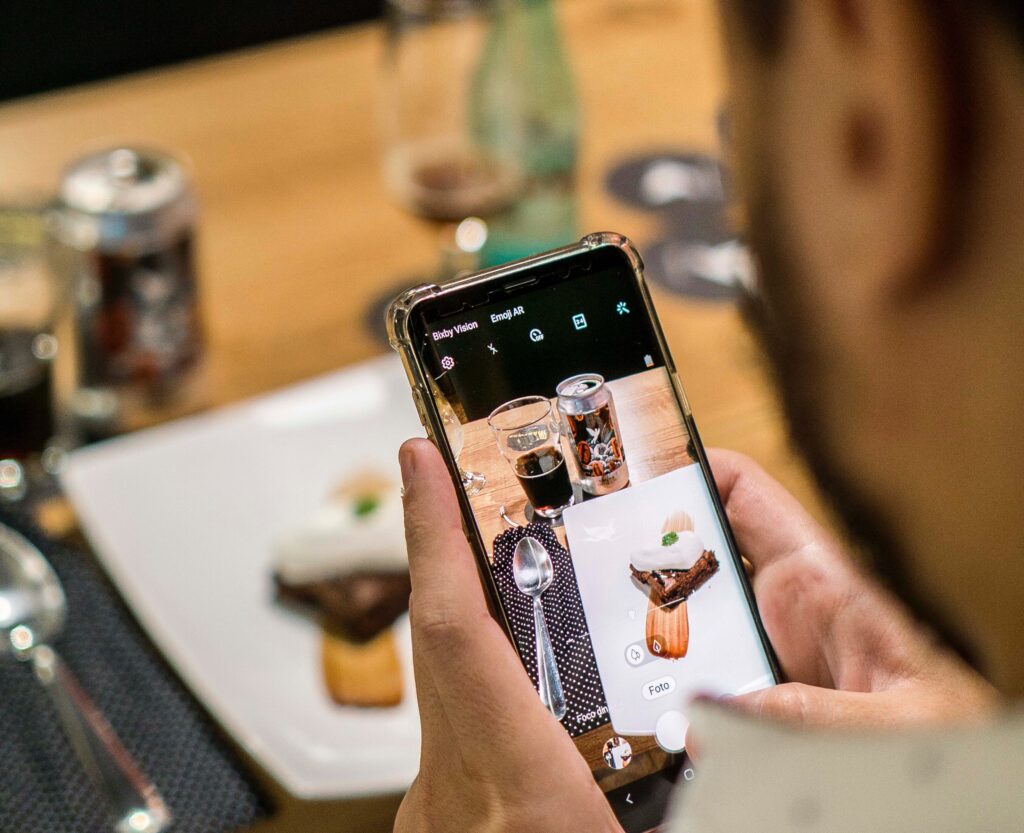
Live more, post less
Our obsession with capturing and sharing images online is compromising our lived experience of them, argues Roshaney Aftab.
Memories are our fleeting grasp of the life we’ve lived, an ever-changing painting of who we are and what we have been. Throughout human history it has been the sharing of memories – lessons learnt, knowledge acquired – which has fuelled both our survival and growth as a species. Yet in this unprecedented online age, memories have taken on a new purpose and we, as their creators, have been given a unique autonomy unlike any we have had before.
For the first time, we are able to weave together the past, present and future through the simple act of taking a picture or filming a video. Each one is a token that our life has been worth living, or simply that we have lived, that we have actually done something. Whereas in the past it would be people’s deeds which distinguished them, now it is the crafted quality of the record of our travels, our clothing, our publicly announced success – in brief, our self-proclaimed memories – which show that we were people of worth in our time here. In other words, in the past, people remembered you. Now, through our online images, we remember ourselves.
But even leaving aside wider society and its ever-increasing demands, this culture of recording our lives satisfies our personal sense of sentimentality. The easier it gets to keep mementos the more we want to remember, and as with any such feedback loop the harder it becomes to step back. While it seems that for many people such cultural reliance on technology poses no real day-to-day threat beyond wasting time, for me it has been the root of an internal conflict which deeply impacts on my way of seeing the world.
Each moment I spend living online is compromising my connection to the present moment; the time I may spend crafting my screen persona is a sacrifice of my experience in the ‘real world’. The more virtual my existence, the less real it feels.
The blend of tangible and intangible which most people seem to possess so naturally doesn’t come to me with anywhere near as much ease, leaving me swinging from one pendulum extreme of online presence to the other as I try to find a balance. From spending hours online doing nothing of significance to disappearing from social media for months, this only shows my inability to accept that the two realms of modern life which I try so hard to separate have moved beyond the point of separation. It needs an act of electronic violence to sunder them. We live in an online age, and our memories have adapted with it.

A study published in the Journal of Experimental Social Psychology attempted to shed light on the impacts social media has on a person’s memory of an experience, focusing particularly on enjoyment and engagement. Participants were made to do different activities with varying levels of media use, from none at all to taking notes that will be discarded to pictures that will be shared online, to name a few.
Although the three studies which made up the overall research opened up a world of further questions, the results remained consistent throughout. Once an experience is externalised – reproduced in any form – you lose the essence of the very moment you’re trying to preserve; each time you pocket a piece of your life, you leave a diminished version in your mind. Put simply, expression is loss of experience. The quality of memory decreases, with participants who wrote down, recorded or shared their experiences scoring around 10% worse on memory tests, as compared to their counterparts who had no such externalisation.
By taking pictures for future reference or videos to look back on, we involuntarily shift our role from someone who is simply experiencing a moment to someone who is now both observing and constructing it. It is this autonomy over which of our memories have most worth, which have most social value, which would we cherish most once the moment moves on, that is the starkest difference between the pre- and post-online age. Even if maintaining a successful social platform or communicating online isn’t part of our job, most of us will still at some point face the choice of deciding whether certain moments are worth capturing or not.

This is further exacerbated by the relatively recent spike of ‘hustle culture’, defined in various ways as the glorification of performing at your maximum capacity at all times in order to reach a particular goal. In other words, it is the archetypal mindset of being the driving force and principal creator of your life. While this phenomenon and its nuances could be an entire article in itself, its influence on memory-making is a key aspect to explore as both rely on this notion of curating your existence.
The continuous demand to prove that you’re striving towards something of worth can naturally lend itself to a greater need to record what you’re doing; as with any such focus (or in this case hyper-focus) on preserving your experiences, their quality in your mind is sacrificed. For a society that is becoming more and more reliant on sharing our lives – a trait that is no longer unique to the famous elite – the rise of trends like hustle culture catalyses the effects of media on all aspects of our life, including those as intimately personal as our memories.
This is all part of the natural ability of the mind to filter the events we encounter according to their significance for our development, which is why painful memories tend to be the most vivid as they are often the greatest learning curves. As social media gives us the power to decide for ourselves which parts of our lives have most value, we are far more susceptible to skewing our priorities in a way that impacts this natural growth.
Although it may simply be my sentimentality for the past, it cannot be denied that by filtering everything through a screen we cast the same hue on so many experiences which may otherwise have been remembered differently in the pre-online age.
Of all things that draws me to renouncing my use of social media it is the cultivation of rich and vivid memories, the appeal of a life that not only appears well-lived but truly feels well-lived.
This exigency for authentic growth and existence is something I repeatedly feel each time I completely step away from media use. While for many this may be a drastic step, for me it’s fundamentally necessary if I am to experience what this world has to offer, as it gives my mind the space to grow and preserve holistically what truly is and will be most important to me.
Despite this, it’s undoubtedly difficult to escape the act of externalising my experiences without also sacrificing the innumerable benefits of media, such as global communication and exposure to cultures and ways of thinking far different from my own. As someone with a deep curiosity about all facets of life, it is primarily this connection with the broader world which makes me return to social media time and time again, despite the compromise I feel it entails.
The polarising desires of wanting to capture and share my thoughts, feelings and memories while also wanting to live them authentically is a dissonance I’m not yet entirely sure how best to resolve. While lives with and without media use both have their pros and cons, one thing for certain is that I always miss the serenity of living without it far more than the energy of living with it.
It shouldn’t require much effort to lift our gazes from our screens and truly see the world around us. We shouldn’t be in such a state of reliance on visual images that we need to take pictures of things we would remember more vividly with our own minds.

What is it that we so seek, what is it that we so lack, that the only remedy is to assume the role of the creator so as to be perceived as people of worth? I don’t claim to possess the best philosophy of life, yet I truly believe that as a society we have become too fixated on the act of showing rather than the process of feeling.
In our desire to keep memories for longer we sacrifice our connection to the present moment, and in retrospect lose a certain vividness and richness of experience by filtering everything through a screen.
But by removing the mental influence that comes with only capturing and sharing memories we deem to be worth keeping, we can allow ourselves to enjoy the comfort of truly letting life unfold and appreciate all of its intricacies as well as its simple normality.
And nor should we consider this selfish. Keeping one’s memories to oneself does not have to be an egotistical exercise. By doing so it allows us to experience life more fully so that, when we do judge it appropriate to share experiences with others, we can offer them a richer description having cultivated more our own interior depth.
It is here that I have always felt most fulfilled, when my memories feel as tangible as the places in which they were formed, without any doubt as to whether what I’m remembering is the act itself or the version I’ve chosen to tell.
To save things for the future or indulge in the present will never be a black and white decision, and the spectrum of grey around each option is something I hope to explore more fully and find greater clarity within. Until then, I simply want to enjoy with greater depth an unadulterated connection to the people and places around me, without letting them slip by indistinctly through the pixels of a screen.
Like what you’ve read? Consider supporting the work of Adamah by making a donation and help us keep exploring life’s big (and not so big) issues!
Roshaney Aftab
A person of deep-seated curiosity and innumerable interests, Roshaney Aftab finds her inspiration in history, literature, faith and the arts. She whiles away her time by indulging in books, exploring nooks of nature and practising calligraphy in letters to friends. Through studying Politics and International Relations, she seeks to understand the workings of the world and manifest her humanitarian ideals.

